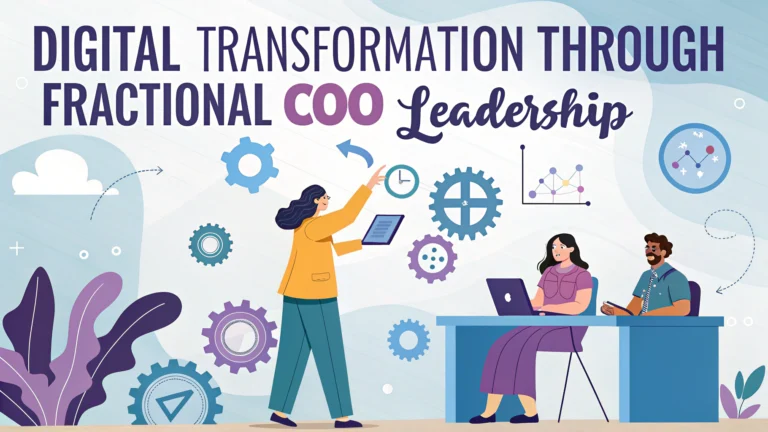A Fractional COO can guide companies through digital transformation by providing experienced leadership without the commitment of a full-time executive.
This strategic approach helps organizations modernize their operations while maintaining cost efficiency and flexibility in leadership structure.
Small and medium businesses can particularly benefit from fractional COO expertise during digital transitions, accessing enterprise-level experience on a part-time basis.
Key Benefits of Fractional COO Leadership in Digital Transformation
- Cost-effective access to senior executive expertise
- Objective third-party perspective on operational challenges
- Flexible engagement terms aligned with project needs
- Rapid implementation of digital solutions
- Risk mitigation through experienced oversight
Digital Transformation Focus Areas
Process automation stands as a primary focus, streamlining workflows and reducing manual tasks.
Data analytics implementation helps drive informed decision-making across departments.
Cloud infrastructure adoption enables scalable, flexible operations.
Customer experience enhancement through digital touchpoints creates competitive advantages.
Implementation Strategy
- Assessment of current digital maturity
- Development of transformation roadmap
- Technology stack evaluation and selection
- Change management planning
- Staff training and development programs
Measuring Success
| Metric | Description |
|---|---|
| Operational Efficiency | Reduction in process time and costs |
| Digital Adoption | Employee usage of new systems |
| Customer Satisfaction | Improved service delivery metrics |
Common Challenges and Solutions
- Challenge: Employee resistance to change
Solution: Structured change management and clear communication - Challenge: Technology integration issues
Solution: Phased implementation approach with pilot programs - Challenge: Budget constraints
Solution: Prioritized roadmap with ROI-focused initiatives
Finding the Right Fractional COO
Look for candidates with proven digital transformation experience in your industry.
Verify their track record of successful implementations and measurable results.
Ensure cultural fit and communication style alignment with your organization.
Taking the Next Step
Contact professional networks like COO Society or LinkedIn to connect with qualified fractional COOs.
Schedule initial consultations to discuss your specific digital transformation needs and goals.
Request references and case studies from previous digital transformation projects.
Project Timeline Expectations
Digital transformation typically spans 12-24 months depending on organizational complexity.
Initial assessment and planning phases usually require 2-3 months of focused effort.
Implementation phases can be structured in 90-day sprints for measurable progress.
Timeline Breakdown
- Discovery and Assessment: 4-6 weeks
- Strategy Development: 6-8 weeks
- Initial Implementation: 3-4 months
- Optimization and Scale: 6-12 months
Cost Considerations
Fractional COO services typically cost 30-40% of a full-time executive salary.
Digital transformation budgets should account for technology investments, training, and change management resources.
| Component | Typical Cost Range |
|---|---|
| Fractional COO Services | $5,000-15,000/month |
| Technology Implementation | $50,000-250,000 |
| Training and Development | $10,000-50,000 |
Ensuring Long-term Success
Build internal capabilities to maintain momentum after the fractional COO engagement ends.
Document processes and create standard operating procedures for new digital systems.
- Establish governance frameworks for ongoing digital initiatives
- Develop internal champions to drive continued adoption
- Create feedback loops for continuous improvement
- Maintain relationships with key technology partners
Transforming Your Digital Future
Digital transformation with a fractional COO provides a strategic advantage in today’s competitive landscape.
Success depends on choosing the right leadership partner and maintaining clear focus on business objectives.
Organizations that embrace this approach position themselves for sustainable growth and operational excellence in the digital age.
FAQs
- What is a Fractional COO and how do they drive digital transformation?
A Fractional COO is a part-time Chief Operating Officer who provides strategic operational leadership on a contract basis. In digital transformation, they guide organizations through technological change, process automation, and digital strategy implementation while optimizing costs compared to a full-time executive. - What are the key benefits of hiring a Fractional COO for digital transformation?
The benefits include access to experienced executive leadership without full-time costs, objective third-party perspective, specialized expertise in digital technologies, flexible engagement terms, and accelerated transformation timelines. - How long does a typical Fractional COO engagement last during digital transformation?
Engagements typically range from 6 to 18 months, depending on the scope of digital transformation, organizational size, and specific objectives. Some projects may require longer commitments based on complexity. - What specific digital transformation initiatives can a Fractional COO lead?
A Fractional COO can lead ERP implementation, cloud migration, workflow automation, digital customer experience enhancement, data analytics integration, and digital workforce enablement initiatives. - How does a Fractional COO ensure successful change management during digital transformation?
They develop comprehensive change management strategies, establish clear communication channels, create training programs, monitor adoption metrics, and address resistance while maintaining stakeholder alignment throughout the transformation process. - What qualifications should companies look for in a Fractional COO for digital transformation?
Key qualifications include proven digital transformation experience, technical literacy, change management expertise, strategic planning capabilities, and a track record of successful operational leadership in relevant industries. - How do Fractional COOs measure digital transformation success?
They establish KPIs including ROI metrics, operational efficiency improvements, customer satisfaction scores, employee adoption rates, cost reductions, and digital capability maturity measurements. - What is the typical cost structure for engaging a Fractional COO?
Costs typically range from daily rates to monthly retainers, usually 30-60% less than a full-time COO. Pricing varies based on experience level, time commitment, project scope, and industry complexity. - How do Fractional COOs integrate with existing leadership teams?
They work collaboratively with C-suite executives, establish clear roles and responsibilities, participate in leadership meetings, and ensure knowledge transfer while maintaining strategic alignment with existing management. - What industries benefit most from Fractional COO-led digital transformation?
Mid-sized businesses, professional services firms, healthcare organizations, manufacturing companies, and technology startups typically benefit most due to their need for experienced leadership during digital evolution.








